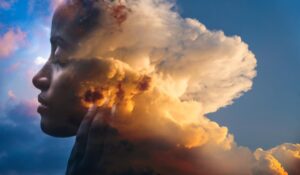
At 21 years old, on a sunny December day in Auckland, I was facing one of the biggest challenges of my life. Dad had rung to tell me that Mum had just a few months to live. She could come home from hospital to die if I returned to help nurse her.
I’d just finished my first stint at theological education, so praying seemed a reasonable option. But prayer had become problematic for me. Growing up in a fundamentalist religious family I’d listened to thousands of petitionary prayers being addressed to the almighty. Not one of them had been answered in any tangible concrete way, despite what people assured me had happened. I was unable to believe in an interventionist God.
As a result, I didn’t consider myself competent at praying. Instead, what passed for prayers were random words that bubbled up from within that didn’t often get past my lips. Sometimes the words ended up on scraps of paper that, when shaped and formed a bit more, seemed like poetry. Or maybe they were letters to an imagined but familiar friend who didn’t need them to be too coherent. My cry of the human heart that never got a response, and I’m not sure I ever wanted one.
But on this day, facing the death of the mother who had adopted me, I had nothing to say. Zilch. No words. No poetry. Just a big silence that got longer and deeper. Until eventually I opened my eyes and knew, without a doubt, that there was nothing out there. Nearly 50 years later I can still vividly recall that moment. How still it was and how secure this realisation made me feel.
Some people see it as the moment I lost faith in God. A certain kind of God, yes. But put another way, I’d say my soul was restless, knowing I could no longer accept the theology I’d inherited. Still pregnant with native religious sensitivity but prematurely pushed by impending death, way beyond my level of spiritual maturity.
Looking back now I can see that this was an important spiritual awakening, but I had little capacity to understand it then. What I now know is that I had glimpsed what could happen if I recalled the God image back from the heavens and into my psyche where, according to Carl Jung, it originates and belongs. But it took me a great deal of reflection, of sitting with the tension of the opposites to get even a slight appreciation of that conundrum.
Jungian dream analysis is where that reflection now happens for me. A surprising development because although I had been reading Jungian literature for over 20 years, I never considered being in analysis or that I had enough dreams to make it work. But some years ago, when I was drowning in a spiritual swamp, Fr John Dourley came into my life, and everything changed.
John was a professor of religion, a Catholic priest, and a Jungian analyst. He said, on the phone from Ottawa, that he only worked with dreams. That was irritating, given that I could only remember one old dream about being kidnapped from my home and forced to drive blindfolded across America. But he’d been recommended, and I was in a spiritual mess. So, every Friday morning I rang Canada and talked with him about my dreams that by then, just kept coming.
Five years later, dream analysis has become my most valued religious practice as I become more aware of, and in tune with what Jungian’s call the Self. That spiraling internal centre that seeks wholeness and integration, and, in the process, is eternally reformed in humanity. It’s a quite unusual way of seeing God, the Divine or the incarnation but one I glimpsed all those years ago when faced with the complete absence of the God I had been raised with.